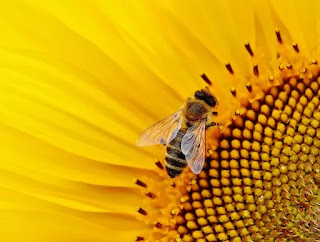What Will Bee ... Will Bee
What Will Bee …Will
Bee
Theology in the Trenches
by Kathleen Kjolhaug
While
chatting with one of my besties, she spoke tentatively, “They’re trying to find
a solution and it’s all coming too fast, so I’m not sure anything is working!”
I
thought for a moment she was talking about COVID19 as we were mere weeks into
the pandemic. She was not. As a former bee inspector for the state of Michigan,
she was talking about her passion…keeper of the bees. My normally energetic
friend sounded sad this morning as our phone conversation continued. Weary she
was as this was the second year in a row she’d found it necessary to replenish
not only the bees but the queen for her hives.
“I
told myself last year that this would be the last time!” With four of the five
hives no longer in use by the little buggers, she was grieving.
“I
don’t mind giving away the honey as I need not make money; I just can’t
afford to keep reinvesting into something only to replace it within the year!”
“How
much does it cost?” I asked wanting to learn more about her dire mood.
“One-hundred-fifty
dollars for each hive and its inhabitants!”
Not bad, I thought, considering therapy could be that per hour.
“Do you enjoy it?” I questioned knowing full well the answer she would give.
Her
gentle voice confirmed my hunch. “Yes. But I need to have compassion for them
as well, and if they are only going to last one season before dying, I just
don’t know if I can do that to them!”
“The problem goes to the microscopic level,” she explained. “During the pollination process, systemic pesticides may be making everything toxic, including the nectar.
This may be responsible for killing the pests, but the honey bees become
victims too. They are finding residue of the pesticide in the bee bread.”
“Bee
bread?” I questioned.
“It’s
when the bees mix the honey with the pollen. This is where they suspect that
the fungicide could be getting in and killing the bees.”
“So
what do they need bee bread for?”
She
knew well the answer. “It feeds the bees ... all of them. But when the queens
are in the process of becoming queens, they are also fed royal jelly. In fact,
all bees get a bit of the royal jelly (something the bees make from their own
bodies). In order to turn into a queen, they are continually fed this in order for them to become
what they were meant to be.”
Now
I wasn’t just curious but fascinated. “Isn’t there already a queen in the colony? Why would they need a new one, and how do they know when they do?”
She
was patient with me as she conveyed her knowledge. “Sometimes they have to
replace her if she gets too old. The community decides when the time is for her
to be replaced. When that time comes, they select a few larvae to be placed into their own cell until the process of each becoming a queen is complete.”
Now I wasn’t born yesterday, so I knew well how things would go over in this house
if there was more than one queen bee around. Thus, I continued. “So what happens if
they set aside three larvae, and eventually all three queens burst forth? How
does that work?”
“They
fight it out! Only a queen bee can sting over and over again. So, they fight it
out by stinging each other over and over until there is only one who survives. In
other words, it’s war! And, the strongest queen wins.”
Wow!
This is like a bestselling thriller, I thought! She continued. “There are even
times when a colony will get too strong and the queen will decide to take half
the bees with her in order to establish a new one. Then, those left behind must
create a new queen by the process we just discussed.”
Well,
there you have it. Apparently, it’s what we’re fed that helps us become who we were created to be. It’s that “royal jelly” we must continue to drink of...if we
are to be like Him. Pretty scriptural
too if you ask me, “More will be expected to whom more is given” (Luke 12:48).
And
there’s proof in that honey bread too. Sweet it is to be partakers of.
Transformative it is to be in communion with His community. Amen.



Comments
Post a Comment
Thank you for praying attention to this space of grace. Your thoughts are sacred and most welcome...God bless your day.